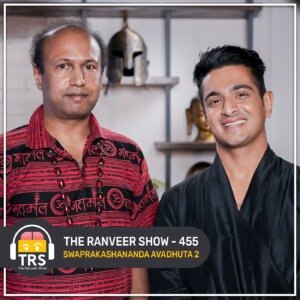
Table of Contents
In the latest episode of The Ranveer Show, I had the honor of welcoming Bhavesh Bhimanathani, a spiritual teacher and a devoted follower of Lord Shiva. Bhavesh brings a wealth of knowledge and experience in spiritual practices, particularly in the realms of Vedanta and Tantra. This episode offers a profound exploration into topics such as the concept of Lokas, the process of death, spiritual practices, and the significance of a Guru. Let’s delve into the key insights shared by Bhavesh in this enlightening conversation.
The Concept of Lokas and the Afterlife
Bhavesh Bhimanathani explains the Hindu concept of Lokas, which are different realms where souls reside after death. These include higher Lokas such as Swarg Lok (heaven) and lower Lokas associated with more challenging experiences. He also discusses what happens to souls after death, particularly focusing on the souls of those who have committed suicide, explaining that they hover for 90 days. Bhavesh emphasizes the importance of understanding these realms and how they relate to our spiritual evolution and karma.
Understanding Jealousy and Negative Emotions
A significant part of the conversation revolves around the concept of jealousy and other negative emotions that are prevalent in big cities like Mumbai. Bhavesh talks about how jealousy stems from a lack of spiritual awareness and how it can hinder personal growth. He stresses that these emotions are major downfalls in the human experience and should be transcended through spiritual practices and inner work.
The Role of Sadhana and Guru in Spiritual Growth
Bhavesh emphasizes the importance of Sadhana (spiritual practice) and the guidance of a Guru in achieving spiritual growth. He explains that different types of Sadhanas are prescribed depending on an individual’s nature, whether they are more Satvik (pure), Rajasik (active), or Tamasik (inert). The Guru plays a crucial role in guiding the disciple through these practices, helping them overcome obstacles and achieve self-realization.
Vedanta and Tantra: Paths to Self-Realization
The conversation delves into Vedanta and Tantra, two distinct yet complementary paths in Hindu spirituality. Vedanta focuses on realizing the oneness of all existence and understanding that everything is an expression of the same divine consciousness. In contrast, Tantra involves specific rituals and practices that use the body and mind to transcend ordinary consciousness and achieve higher states of awareness. Bhavesh explains that while both paths aim for the same goal—self-realization and liberation—Tantra is often misunderstood and requires a deeper understanding guided by a competent Guru.
Navigating Life with Awareness and Non-Reactivity
Bhavesh shares practical wisdom on living a life of awareness and non-reactivity. He encourages cultivating a mindset where one is not overly attached to the highs and lows of life, but instead, maintains a balanced state of mind. This involves observing emotions without getting caught up in them and understanding that all experiences, whether positive or negative, are temporary. This approach not only aids in spiritual growth but also helps in leading a more peaceful and content life.
Conclusion: The Journey of Spiritual Awakening
This episode with Bhavesh Bhimanathani is a deep dive into the spiritual realms, offering insights into the complex concepts of Lokas, the process of death, and the paths of Vedanta and Tantra. Bhavesh’s teachings emphasize the importance of awareness, non-reactivity, and the guidance of a Guru in one’s spiritual journey. For anyone interested in spirituality, this conversation provides valuable knowledge and guidance on how to navigate the path toward self-realization.
Thank you for joining us in this exploration of spirituality and the afterlife. Until next time, continue your journey with curiosity, openness, and a commitment to growth.

FUTURE OF FITNESS WITH FARBOOD NIVI
In this enlightening talk, fitness expert Farbood Nivi discusses the future of fitness and how new methods and science can help us lose fat faster

AVADHUTA BABA RETURNS – DIVING INTO MYSTICISM, FAKE GURUS, AND SPIRITUAL SECRETS
In this fascinating talk, Avadhuta Baba shares deep spiritual knowledge, covering hidden, mystical topics that many are curious about but few truly understand. From the
